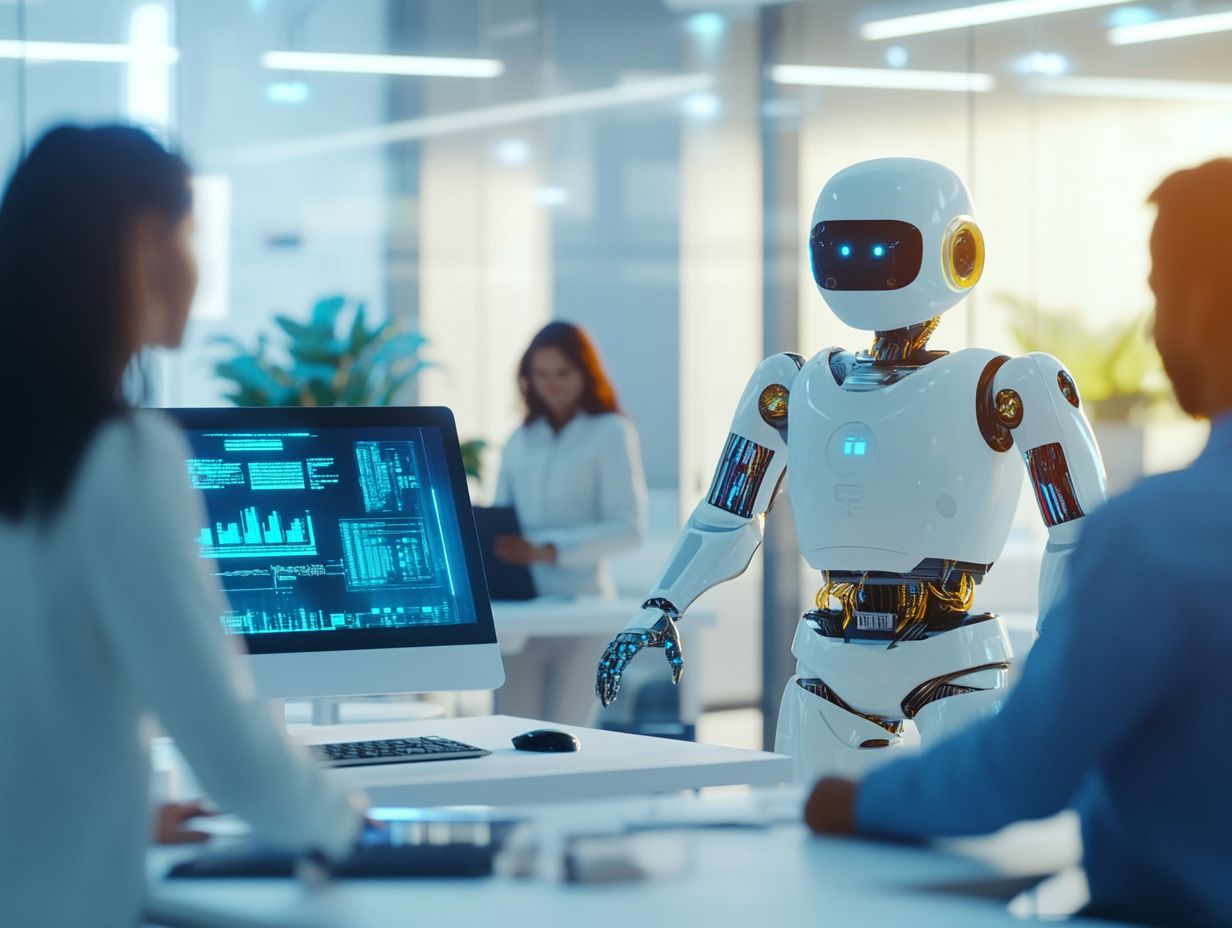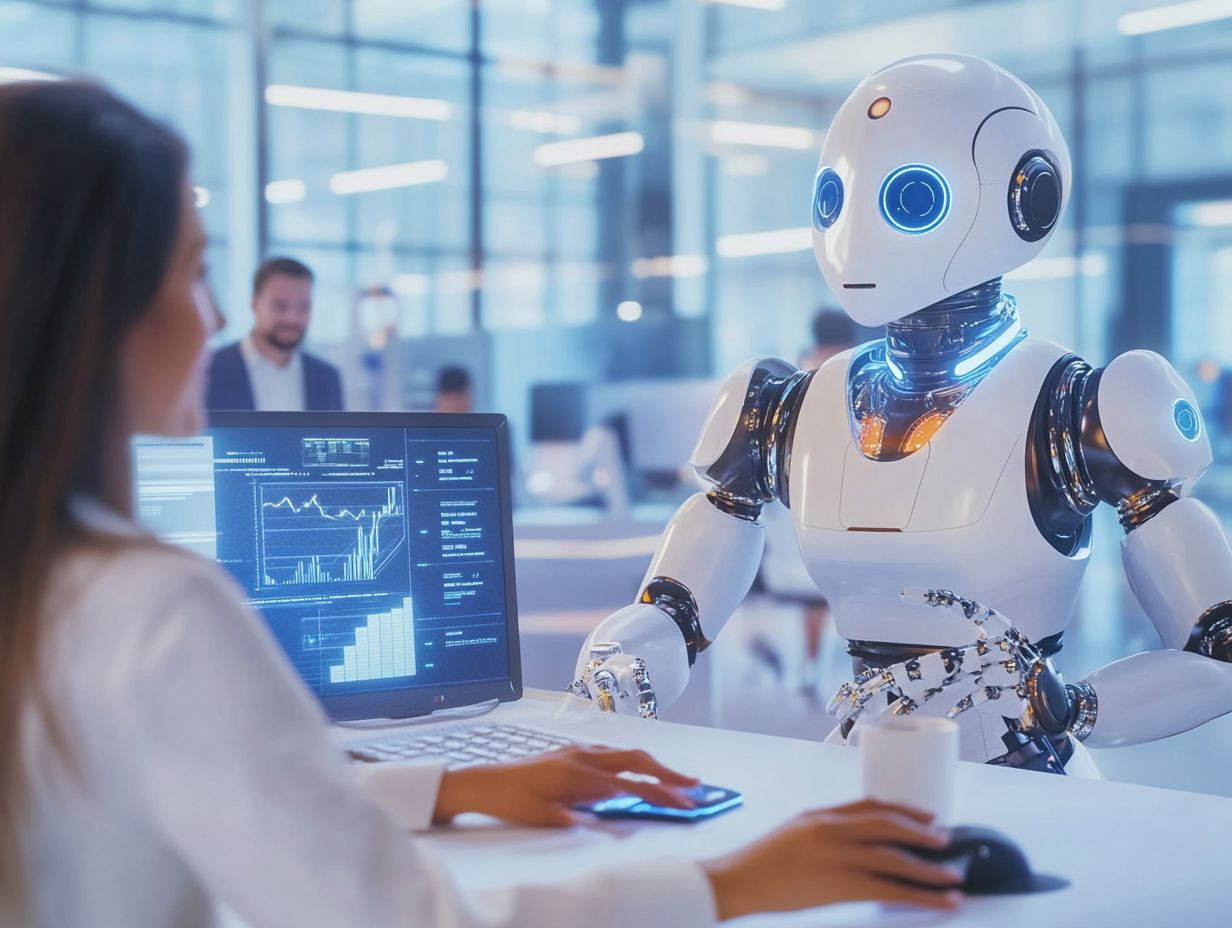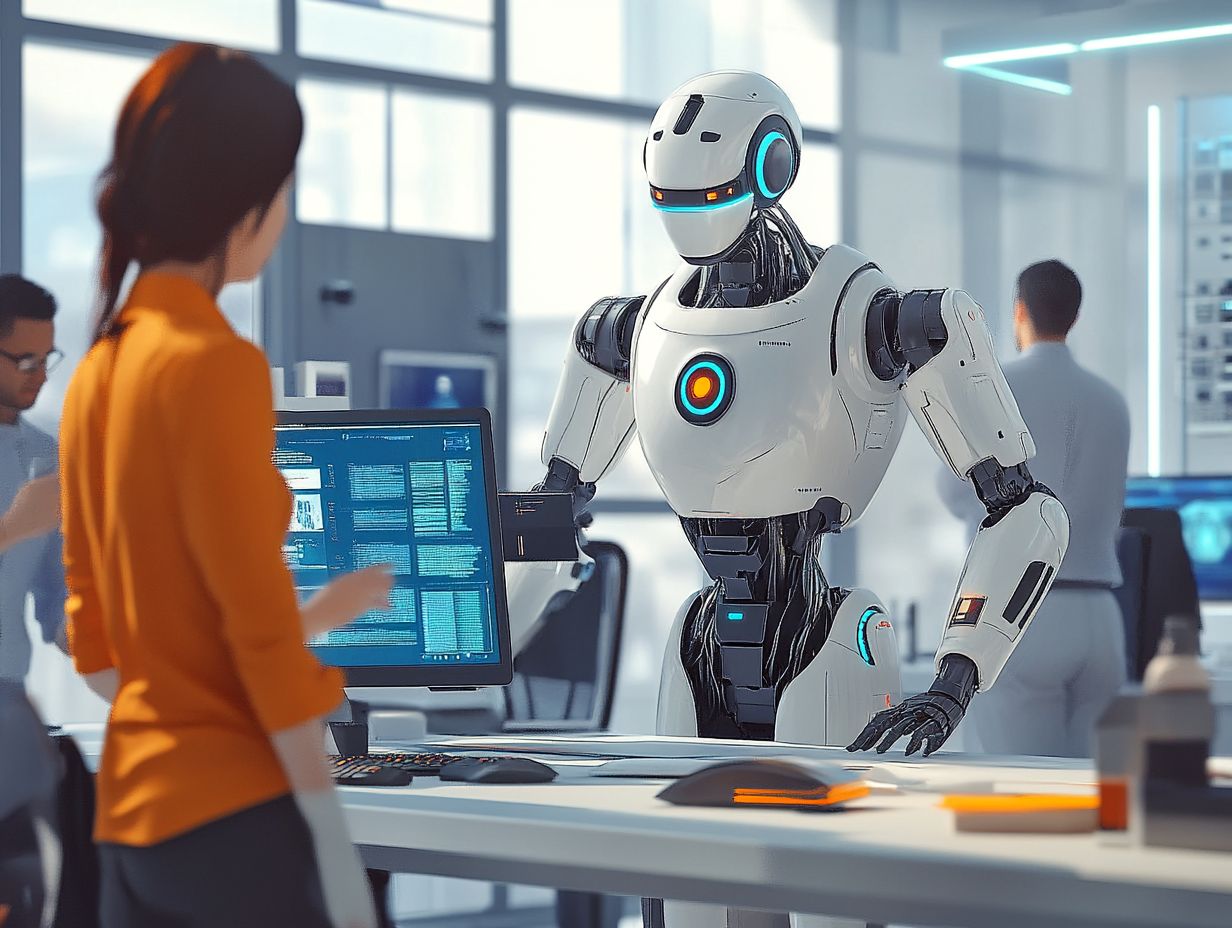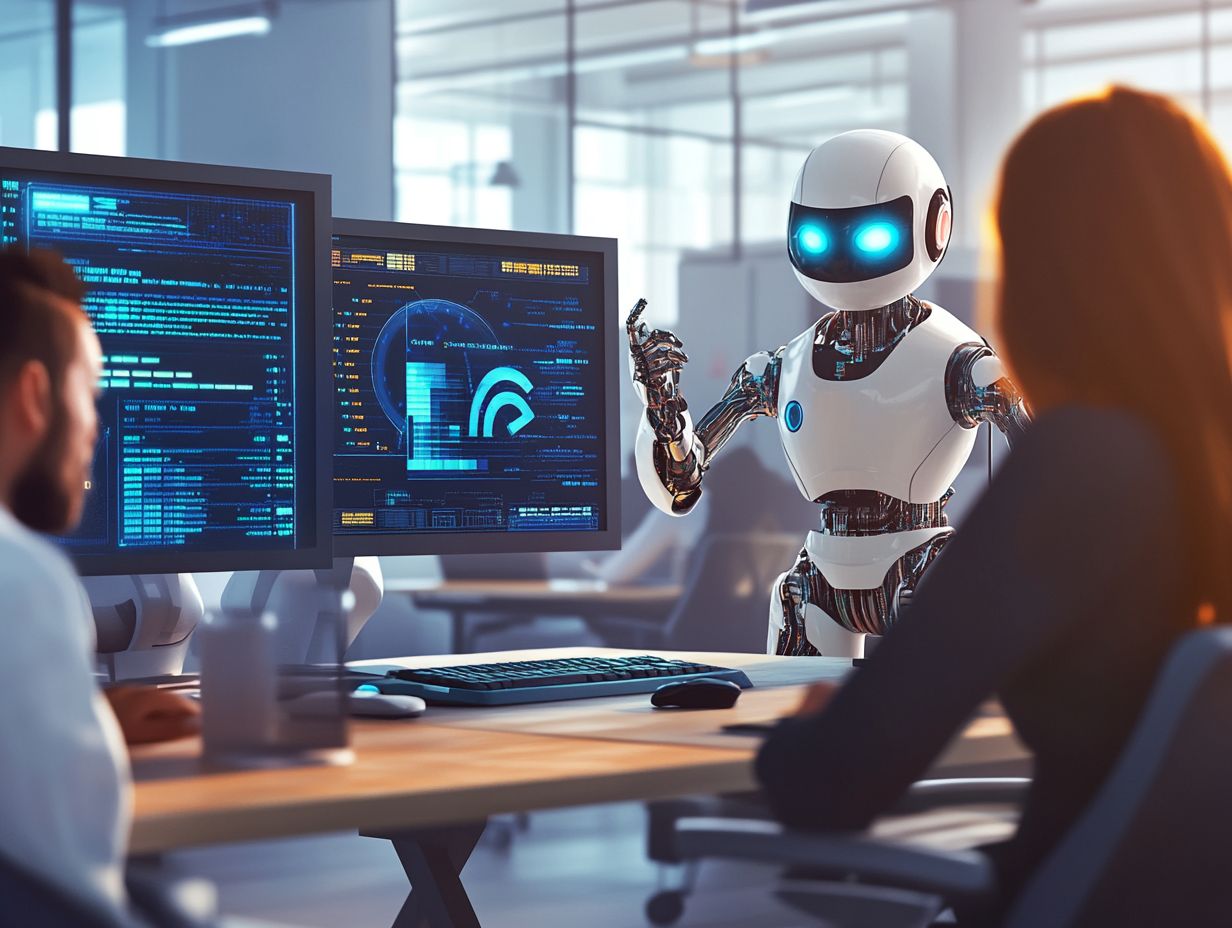The Impact of AI on Job Markets: What to Expect
Artificial Intelligence (AI) is transforming your world at an unprecedented pace. It is reshaping industries and redefining the nature of work.
This exploration covers the foundational concepts of AI and traces its evolution, revealing how it influences job markets today. You ll see the dual nature of AI’s impact: the potential disruption it poses to traditional jobs and the new opportunities it creates for you and others.
Essential skills needed for AI-related roles will be highlighted. You’ll also delve into the ethical considerations that emerge as this technology continues to advance.
Prepare to understand the future of work in an AI-driven landscape, where your adaptability will be key.
Contents
Key Takeaways:

- AI can disrupt traditional jobs.
- It also creates new job opportunities.
- Skills in ethical AI practices are necessary.
Understanding Artificial Intelligence (AI)
Artificial Intelligence (AI) represents the simulation of human intelligence processes through computer systems. It encompasses a diverse array of technologies, including machine learning, natural language processing, and robotics.
As you observe the growing adoption of AI, its profound implications for the job market and operational efficiency become clear, impacting sectors like finance and healthcare.
The swift evolution of AI technologies not only reshapes traditional job roles; it also opens new avenues for job seekers like you who possess the requisite skills and knowledge.
Definition and Key Concepts
Artificial Intelligence (AI) refers to the development of algorithms and systems that enable machines to perform tasks requiring human intelligence, such as reasoning, learning, and problem-solving.
This cutting-edge field includes various subdomains, with machine learning being a pivotal method where computers learn from and adapt to data.
By embracing AI automation, you can streamline processes and significantly enhance operational efficiency across diverse sectors, from healthcare to finance and supply chain management.
As you integrate these advanced technologies into your organization, the implications for job roles are significant. Many existing positions will evolve, while new roles will emerge, prompting a shift in the skills landscape.
To navigate this transition, you’ll need to adapt by acquiring skills in data analysis and technology management. This will position you to thrive in an increasingly automated world.
The Evolution of AI and Its Current State

The evolution of artificial intelligence is extraordinary. It began with theoretical foundations established by visionary pioneers and progressed to extensive applications across various sectors.
This transformation has profoundly affected the job market and operational efficiency.
Renowned institutions such as Goldman Sachs, the McKinsey Global Institute, and the University of Oxford are exploring how AI is redefining the workplace and job roles, creating a fertile ground for innovation.
History and Current Applications
The history of artificial intelligence is filled with important breakthroughs. Today, AI has diverse applications that elevate productivity and efficiency across various industries.
From its theoretical origins to practical implementations, AI has undergone a remarkable evolution. This is particularly evident in customer service, finance, and healthcare.
In customer service, automation tools revolutionize interactions and provide immediate assistance. This transformation enhances service quality and minimizes operational errors.
In finance, AI algorithms excel at managing investments and detecting fraud with striking accuracy. They enable real-time decision-making that optimizes capital allocation.
In healthcare, predictive analytics and diagnostic tools elevate patient care and operational effectiveness.
These advancements go beyond technology; they reshape the job market and create a demand for new skills. Skills in data analysis, machine learning, and interpersonal communication are now essential. This ensures that the workforce is prepared for an AI-driven future.
The Impact of AI on Job Markets
The impact of artificial intelligence on job markets is intricate. It encompasses both job displacement through AI automation and the creation of new opportunities that require different skills.
As industries evolve in response to technological advancements, it is crucial to understand the dynamics of job displacement. New roles, such as AI ethicists who ensure responsible AI use and machine learning engineers, are emerging.
This understanding is invaluable as you navigate the ever-changing employment landscape.
Potential Disruption to Traditional Jobs

The rise of AI automation is set to disrupt traditional jobs across various sectors. This disruption prompts significant employee turnover and demands a re-evaluation of the skills landscape.
In fields like finance, media, and law, AI capabilities advance rapidly. They automate processes once exclusive to human professionals, creating an urgent need for adaptation to new technologies.
As AI takes over tasks like data analysis and legal research, you must recognize the urgency of enhancing your skills. Pivoting towards areas where your human insight and creativity remain invaluable is crucial.
By prioritizing retraining and ongoing education, you can mitigate job displacement and evolve alongside these technological advancements.
New Opportunities and Job Creation
While AI presents challenges in terms of job displacement, it also opens doors to exciting opportunities for skilled professionals.
Emerging roles, such as AI ethicists, machine learning engineers, and AI prompt engineers, create a dynamic landscape for those willing to adapt. This transformation is particularly pronounced in healthcare, finance, and marketing.
In healthcare, there is a growing demand for professionals who can analyze data and develop algorithms to improve patient outcomes. Similarly, positions focusing on risk analysis and automation are becoming increasingly important in finance.
To thrive in this evolving environment, you ll need a combination of technical skills like coding and data analysis and essential soft skills, such as critical thinking and adaptability. This underscores the importance of lifelong learning in today s job market.
Preparing for the Future of Work
Preparing for the future of work in an AI-driven job market requires a proactive stance on skills and training.
It’s essential to emphasize the importance of continuous education and adaptability, whether you re a job seeker or a human resources professional.
Embracing this mindset will equip you to thrive in an ever-evolving landscape.
Skills and Training Needed for AI-Related Jobs

To thrive in AI-related jobs, you need to build key skills, including the ability to analyze data and an understanding of machine learning methods. Additionally, it’s important to grasp the ethical implications surrounding AI technologies.
Strong programming abilities in languages like Python or R, along with familiarity with big data technologies, are essential for anyone aspiring to excel in this field.
As AI evolves at breakneck speed, the significance of lifelong learning cannot be overstated. Stay current with the latest advancements and emerging trends.
Dive into training programs and certifications, such as those offered by platforms like Coursera or edX. These can greatly enhance your qualifications, equipping you with the knowledge and expertise required to navigate this dynamic job market effectively.
Ethical Considerations of AI in the Job Market
As artificial intelligence continues to transform the job market, it s essential to address ethical considerations like bias and fairness. By doing so, you contribute to fostering a just and equitable workplace, ensuring that advancements in technology benefit everyone involved.
Addressing Bias and Fairness
Addressing bias and fairness in AI systems is essential for preventing discrimination and ensuring equal opportunities, especially during recruitment processes.
Bias in AI algorithms can stem from various sources, including historical data that mirror existing inequalities and subjective inputs from developers. Such biases can severely impact job seekers, reinforcing stereotypes and putting qualified candidates at a disadvantage based on their race, gender, or socioeconomic background.
To combat this, employ inclusive data sets, conduct regular audits of algorithms for fairness, and integrate diverse perspectives within your development team to enhance the recruitment process.
Establish transparent guidelines for AI usage in hiring. Prioritize human oversight to ensure technology promotes equity rather than acting as a barrier to opportunity.
Frequently Asked Questions
What is the impact of AI on job markets?
The impact of AI on job markets refers to the changes and disruptions that are expected to occur as a result of the increasing use of artificial intelligence technology in various industries.
How will AI affect employment rates?
AI is expected to lead to both job creation and job displacement. While some jobs may be replaced by AI, it is also expected to create new jobs in industries such as data analysis, software development, and machine learning.
What industries are most likely to be impacted by AI?
AI is expected to significantly impact industries that involve repetitive and predictable tasks, such as manufacturing, transportation, and customer service. However, industries like healthcare, finance, and education are also likely to be affected.
What skills will be in demand as a result of AI?
As more jobs involve working with AI technology, skills such as data analysis, programming, and critical thinking will be in high demand. Soft skills like creativity, adaptability, and problem-solving will also be valuable in navigating the changing job market.
Will AI completely replace human workers?
No, AI technology is not expected to completely replace human workers. While it may replace certain tasks and jobs, there will still be a need for human oversight and decision-making. Additionally, new jobs are expected to be created in industries related to AI development and maintenance.
How can individuals prepare for the impact of AI on job markets?
Individuals can prepare for the impact of AI by continuously upgrading their skills and staying updated on advancements in AI technology. It may also be helpful to develop a diverse skill set and be open to learning new things to adapt to the changing job market.
Stay ahead of the curve by continuously learning and adapting your skills for the future of work!






